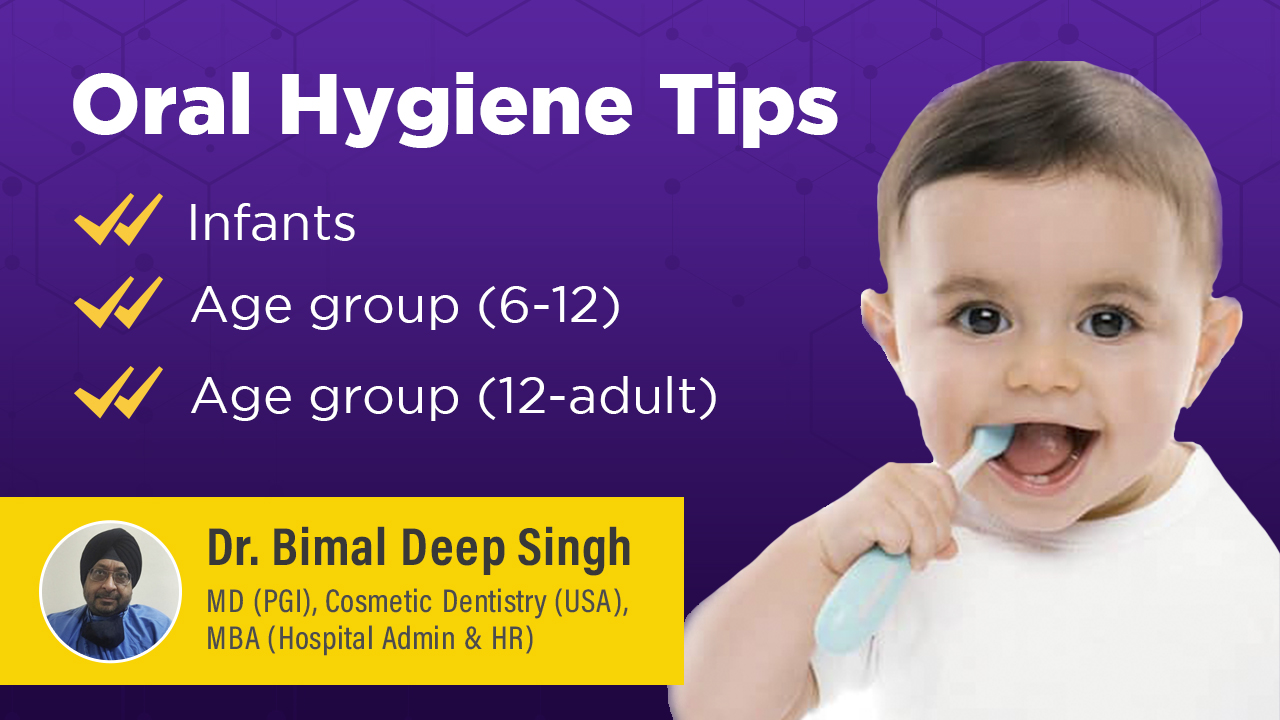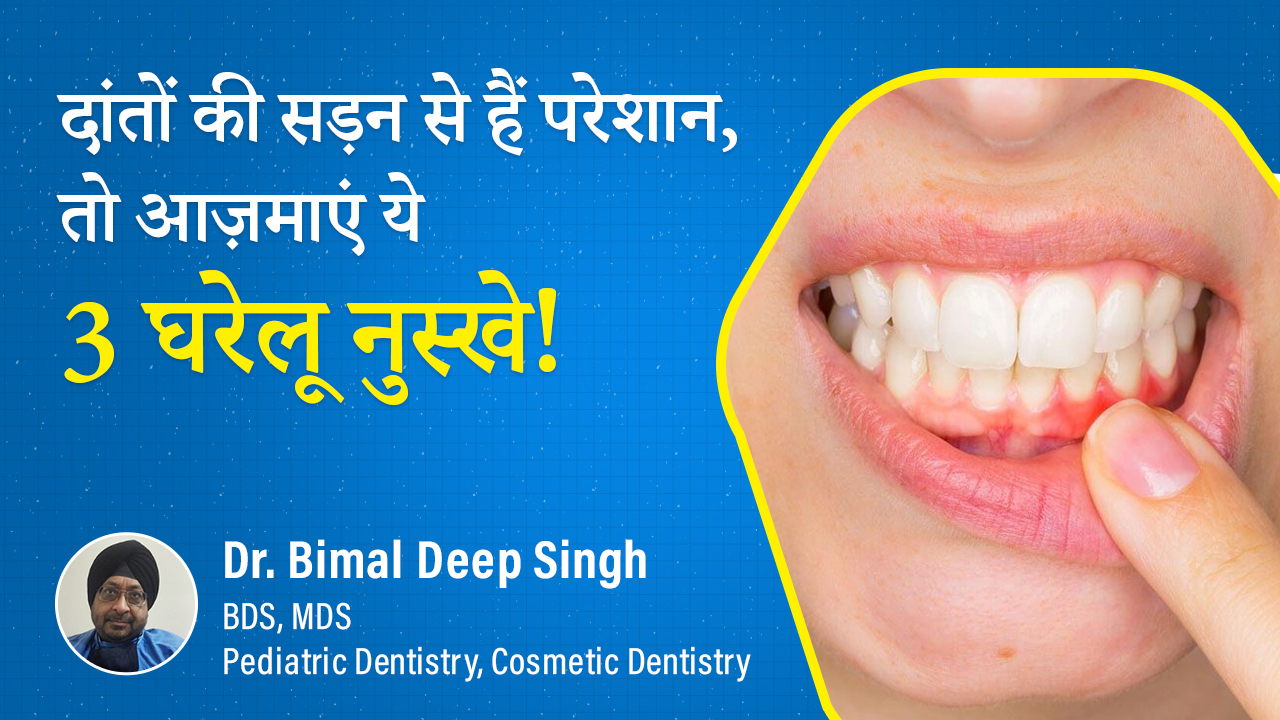How can you keep you teeth clean? | Oral hygiene and dental care by Dr. Bimaldeep
In this video, Simplihealth expert, Dr. Bimal, Dental Consultant, Head of the Dental Department at Apollo clinic, Chandigarh I have expertise in Pediatric Dentistry and Cosmetic Dentistry. Today we will talk about your teeth and other oral hygiene measures. I will discuss this topic in three parts:
- In the first part, we will focus on the oral hygiene of infants.
- In the second part, we will discuss oral measures needed for children in the age group 6-12.
- The last part will be about children aged 12 years above and adults.
Oral hygiene in infants
So let’s discuss part one, which is about infants and toddlers since a newborn baby is unaware of things like teeth. Oral hygiene of the children is the responsibility of parents. They need to either tell or teach their children that after every feed, especially after every feed, they should clean their gums so reflux should be formed in the child, as whenever he eats something, something goes inside his mouth and cleans it.
Since newborns do not have teeth, they must develop a mental or more appropriate neural reflex so that after each feed they are engaged in, something goes inside the mouth and cleans the gums. And this is primarily the responsibility of the parents, especially the lactating or feeding mothers.
For this, you don’t have to do much like I have told you before. Take a muslin cloth, cut into three to four strips and boil it. Wrap the boiled muslin cloth on the finger and after every milk feed, clean their gums so that no food/milk particles adhere to the gums and will clean the bacteria if any are present.
So in this way, we can take care of oral hygiene in infants. In addition, we can use some chemical aids such as Flouride drops. It’s nothing more like a chemical that acts on oral bacteria.
Oral measures needed for children in the age group 6-12
Then we come to children above six years as you must have observed that by the age of two to two and half years, every child has their milk teeth. During that period, parents must encourage their children to brush. We must make them brush twice a day. It should be done simultaneously on two teeth in a circular motion, five times clockwise and five times anti-clockwise from left to right and vice versa.
In addition, we can rub their teeth with a fluoride drop solution readily available on the market. Then, the most critical age group is the age group of six-twelve years. By the age of six years, usually, children have their permanent first molar teeth. Their smiling or incisors teeth and lower incisors have erupted.
The children are in their mixed dentition period, in which they have few milk teeth and few permanent ones. So the parent needs to maintain and clean their teeth so that the children’s teeth are in good shape ahead of their life. So in this stage, we use toothpaste for children, which has 500 parts per million. I will repeat that 500 parts per million toothpaste are available in the market like Colgate or pepsodent, Chicco, ICPI, and many more. So whenever you buy toothpaste for the age group six-twelve years old, don’t buy an adult toothpaste; instead, select the one with 500 parts per million toothpaste.
So how to use this type of toothpaste?
The first thing is to use a junior brush with soft bristles and use paste equivalent to the size of a pea. Again we must brush in a circular motion from left to right extreme or vice versa. Similarly, do with the outer and inner side of teeth. Secondly, we can use pediatric mouthwash, which contains fluorides. And I will encourage you to add fluoride-based mouthwash to your children’s brushing regime. Finally, use fluoride-based toothpaste and mouthwash, let your child rinse with mouthwash at night, and avoid water so that the medicine effect lasts longer.
Oral measures for children above the age of 12 and adults
By following the above measures, we can take care of the oral hygiene of the six-twelve years of age group. But after the age of twelve years, as you must have seen, whenever we give any medicine to the children, we prefer liquid, whether it’s antibiotics or any pain killer, we prefer syrup as the concentration of medicine is less in syrup. But as the child grows, we start giving them tablets. Likewise, as the child develops, their requirements for toothpaste change.
We use 1000 parts per million. We use 250 parts per million for infants and toddlers, followed by 500 parts per million for the age group of 6-12 years, and then we use 1000 parts per million for those above the age of 6 years. All the commercially available toothpaste have mentioned this in their ingredients. Irrespective of the brand of adult toothpaste, children in the age group above 12 years must use toothpaste with a fluoride content of 1000 parts per million.
Oral hygiene measures
Children must brush before going to school. You may remove food particles by water rinse after lunch, but brushing should be the last thing at night before going to sleep. In addition, we do add mouthwash. I want to add a third thing which is dental Floss. It is nothing more than a wax thread that is either available in rolls or pre-cut strands or comes in a Y-shaped container. So these three things, especially at night; brush, mouthwash, and Floss, or brush, Floss, and mouthwash.
You must follow this routine and must do Floss every night. In addition, and especially in children in this age group, we encourage them to brush in an up and down position so that if we are cleaning the upper layer of teeth by following up and down brushing, we are dragging food particles from up to bottom and vice versa in the lower set of teeth.
Likewise, we must similarly clean the innermost teeth. Keep in mind that we must clean their teeth carefully and efficiently. If we go by the book, the ideal time for cleaning teeth is 3-5 minutes. The children must brush for at least 3 minutes, especially at night. We must use Floss adequately. If we keep all these things in our minds, we can have as many sweets and fried food. Children may have anything like in a party they like to have coke.
So if they take care of their teeth in the proper manner, they can have anything. So these are a few things that I would like you all to incorporate into your house to have a healthy smile for your children and trouble-free eating habits.



